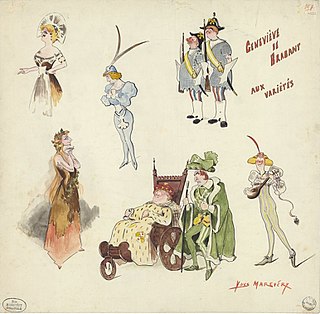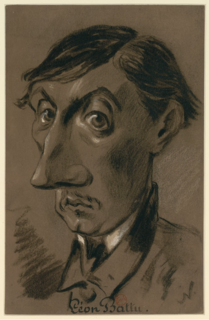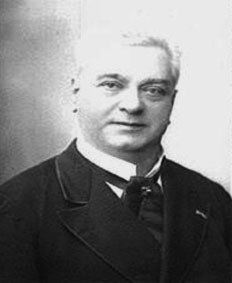
Jacques Offenbach was a German-born French composer, cellist and impresario of the Romantic period. He is remembered for his nearly 100 operettas of the 1850s to the 1870s, and his uncompleted opera The Tales of Hoffmann. He was a powerful influence on later composers of the operetta genre, particularly Johann Strauss Jr. and Arthur Sullivan. His best-known works were continually revived during the 20th century, and many of his operettas continue to be staged in the 21st. The Tales of Hoffmann remains part of the standard opera repertory.

Geneviève de Brabant is an opéra bouffe, or operetta, by Jacques Offenbach, first performed in Paris in 1859. The plot is based on the medieval legend of Genevieve of Brabant.

Le pont des soupirs is an opéra bouffe set in Venice, by Jacques Offenbach, first performed in Paris in 1861. The French libretto was written by Hector Crémieux and Ludovic Halévy. Plays, including melodramas, set in Venice were quite common in Paris in the early 19th century; the libretto, by the successful team from Orphée aux enfers, also nods towards the operas La reine de Chypre (1841) and Haydée (1847). Gänzl describes the piece as being in Offenbach's "best bouffe manner", noting a "long list of sparkling and funny musical pieces": the multiple serenade beneath Catarina's balcony, the tale of the loss of the Venetian fleet, the parody of an operatic mad scene for Catarina, and a farcical "quatuor des poignards". Offenbach would return to Venice in the Giulietta act of his final work Les Contes d'Hoffmann.

Édouard-Théodore Nicole, known as Léonce, was a 19th-century French actor and singer.

Croquefer, ou Le dernier des paladins is a one-act opéra bouffe by Jacques Offenbach to a French libretto by Adolphe Jaime and Étienne Tréfeu, first performed in 1857.

Lise Tautin, was a French soprano, associated with the opéra-bouffe in Paris in the middle of the 19th century, particularly the works of Offenbach.

Le 66 is an opérette in one act of 1856 with music by Jacques Offenbach. The French libretto was by Auguste Pittaud de Forges and Laurencin. Gänzl describes the work as "in the rustic vein of Le violoneux and Le mariage aux lanternes".

Maître Péronilla is an opéra bouffe in three acts of 1878 with music by Jacques Offenbach. The French libretto was by the composer with Charles-Louis-Étienne Nuitter and Paul Ferrier.

Monsieur et Madame Denis is a one-act opéra comique with music by Jacques Offenbach to a French libretto by Laurencin and Michel Delaporte, first performed in 1862. The work was based on a popular vaudeville, and included a ‘chaconne’ which became well known in its own right.

Pomme d'api is a one-act opérette of 1873 by Jacques Offenbach with a French libretto by Ludovic Halévy and William Busnach.

The Théâtre des Folies-Marigny, a former Parisian theatre with a capacity of only 300 spectators, was built in 1848 by the City of Paris for a magician named Lacaze and was originally known as the Salle Lacaze. It was located at the east end of the Carré Marigny of the Champs-Élysées, close to the Avenue Marigny, but faced west toward the Cirque National on the other side of the square.

Tromb-al-ca-zar, ou Les criminels dramatiques is a bouffonnerie musicale in one act of 1856 with music by Jacques Offenbach. The French libretto was by Charles-Désiré Dupeuty and Ernest Bourget. With its dialogue containing plays on words and stage business from contemporary Parisian dramas and operas, it is described by Kracauer as satirizing the romantic bandits of grand opera.
Jean Le Poulain was a French stage actor and stage director.

Léon Battu was a French dramatist, born 1829 in Paris, where he died on 22 November 1857.

Jules Brasseur was a French actor and singer, born 1829 in Paris and died in the same city in 1890, who achieved considerable popular success in Paris and around France in the second half of the 19th century.
Alfred Delacour or Alfred-Charlemagne Delacour, real name Pierre-Alfred Lartigue, was a 19th-century French playwright and librettist.
Armand Lapointe was a French novelist, journalist and playwright. He also wrote the libretto of the opérette bouffe Mesdames de la Halle by Jacques Offenbach.

Gil-Pérès, real name Jules-Charles Pérès Jolin, was a 19th-century French stage actor and vaudevilliste, who was a member of the troupe of the Théâtre du Palais-Royal in Paris in the mid-19th century, and created several roles in Offenbach operettas.

Henri Tayau was an operetta singer and actor, and violinist, who during a short but successful career performed many light tenor roles in opéra-bouffes of Offenbach, and created several roles, the most notable being that of Orphée in Offenbach's greatest success, Orphée aux Enfers.









